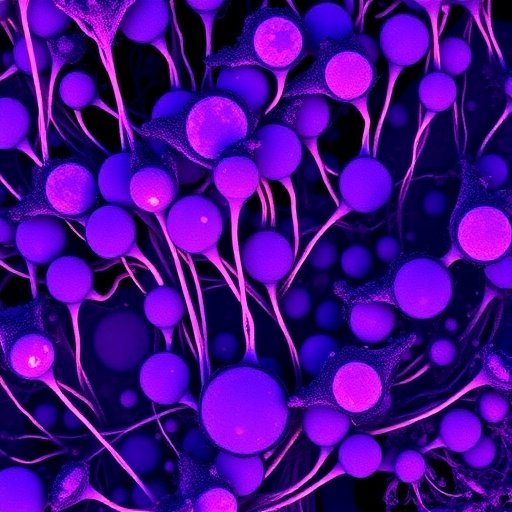In a groundbreaking study published in BMC Cancer, researchers have unveiled pivotal insights into the complex landscape of lipid metabolism in esophageal squamous cell carcinoma (ESCC) among the Chinese Kazakh population. Utilizing a dual-omics approach combining lipidomic and transcriptomic analyses, the study elucidates the intricate interplay between lipid metabolic reprogramming and gene expression in tumor tissues, shedding new light on potential therapeutic avenues.
Esophageal squamous cell carcinoma remains a formidable clinical challenge, particularly in certain ethnic groups such as the Kazakhs of Xinjiang, China, where incidence rates are notably high. Despite advancements in molecular oncology, the precise metabolic alterations driving ESCC progression in this demographic have remained largely enigmatic. Addressing this gap, the study focused on characterizing lipidomic profiles alongside transcriptomic changes to decode tumor-specific metabolic pathways.
The investigative team employed ultra-performance liquid chromatography coupled with tandem mass spectrometry (UPLC‒MS/MS) to perform absolute lipid quantification on serum samples from ESCC patients. Thirteen distinct lipid classes emerged from these analyses, with triglycerides (TAGs) dominating the profile. This rich lipid diversity set the stage for more detailed assessment of potential metabolic dysregulations associated with malignant transformation.
Among the lipid species quantified, phosphatidylcholine (LPC), phosphatidylethanolamine (PE), and ceramide (Cer) levels showed significant differentiation between ESCC patients and controls. The alterations in these specific lipid categories are noteworthy since they have been implicated previously in cell membrane integrity, signaling cascades, and apoptotic regulation — processes central to cancer biology.
Concurrent transcriptomic profiling of tumor tissues revealed marked enrichment of genes involved in fatty acid synthesis, carnitine biosynthesis, and other lipid metabolic routes. The simultaneous upregulation of these pathways suggests a comprehensive reprogramming mechanism whereby tumor cells may exploit enhanced lipid biosynthesis to meet the demands of rapid proliferation and survival under metabolic stress.
Integrating lipidomic with transcriptomic data through bioinformatic analyses, the researchers highlighted major metabolic axes including fatty acid synthesis and degradation, cholesterol metabolism, and notably the AMPK signaling pathway as critical contributors to ESCC pathology. AMPK, a key cellular energy sensor, appears to play a regulatory role in modulating lipid metabolism under tumoral conditions.
To substantiate AMPK’s involvement, targeted lipidomic analysis was conducted on ESCC cells with AMPK knockdown using UPLC‒MS/MS. The results suggested that AMPK deficiency disrupts lipid metabolic reprogramming, underscoring its potential as a therapeutic target. This finding aligns with growing evidence positioning AMPK not only as a metabolic checkpoint but also a candidate for targeted cancer therapy.
The study’s implications extend beyond descriptive metabolic mapping, proposing mechanistic links between AMPK activity and lipid metabolic shifts in ESCC. This correlation enhances our understanding of tumor biology in the Kazakh ethnic group and opens new vistas for diagnostic biomarker development and novel interventions tailored to metabolic vulnerabilities.
Critically, lipid metabolic reprogramming denotes a hallmark of cancer metabolism, reflecting alterations that could be exploited for therapeutic gain. The enrichment of lipid biosynthesis and degradation pathways underscores a cancer cell’s metabolic plasticity, capable of adapting to nutrient and energy fluctuations prevalent within the tumor microenvironment.
The researchers caution that while their findings are compelling, further investigation into the dynamic roles of individual lipid species and their interactions with key regulatory genes is essential to confirm causality and therapeutic efficacy. Expanding the cohort size and incorporating longitudinal studies may consolidate these initial observations.
Moreover, this study contributes to the growing field of precision oncology by emphasizing ethnic and molecular specificity. Tailoring therapies based on metabolic profiling aligned with genetic backgrounds represents a paradigm shift that could improve treatment outcomes and lower adverse effects in vulnerable populations.
By elucidating the biochemical and molecular underpinnings of ESCC in the Chinese Kazakh minority, the research bridges a crucial knowledge gap and sets a foundation for translational applications. It encourages leveraging integrative omics approaches to unravel cancer complexity and heralds an era where metabolism-centric oncology becomes a standard facet of patient management.
In conclusion, the integration of lipidomic and transcriptomic analyses reveals a sophisticated metabolic network supporting ESCC tumorigenesis, with AMPK signaling emerging as a central axis. The findings propose a promising therapeutic target and enrich the molecular narrative of cancer metabolism in ethnically distinct cohorts, fostering hope for more effective, personalized combat against esophageal cancer.
Subject of Research: Lipid metabolic reprogramming and gene expression in esophageal squamous cell carcinoma (ESCC) among Chinese Kazakh patients
Article Title: Lipidomic and transcriptomic analysis and its therapeutic implications in Chinese Kazakh patients with esophageal squamous cell carcinoma
Article References:
Sun, Q., Liu, R., Zhang, H. et al. Lipidomic and transcriptomic analysis and its therapeutic implications in Chinese Kazakh patients with esophageal squamous cell carcinoma. BMC Cancer 25, 1696 (2025). https://doi.org/10.1186/s12885-025-14858-7
Image Credits: Scienmag.com
DOI: 10.1186/s12885-025-14858-7
Keywords: Esophageal squamous cell carcinoma, lipidomics, transcriptomics, AMPK signaling pathway, fatty acid metabolism, triglycerides, phosphatidylcholine, phosphatidylethanolamine, ceramide, metabolic reprogramming, Kazakh ethnic group, precision oncology




